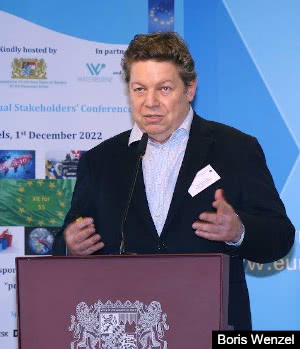
At the seventh annual stakeholder conference organized by Feport, the federation of private port terminalists European, which was held on the first of December in Brussels, Boris Wenzel, as they say, took off the pebbles from the shoes. Recently appointed co-CEO of the company Turkish terminalista Yilport, in its examination of past crises and of those in progress that have had and are determining a considerable impact on port terminalists, Wenzel expressed a harsh Recrimination for the behaviour of shipping companies containerized in the period of crisis of recent years coinciding with the spread of the Covid-19 pandemic.
Period - recalled Wenzel - in which "reliability of maritime transport had totally collapsed because of these crisis and one did not know if a ship would arrive or not." Very severe the denunciation of the conduct held in the period, in his to say, from the maritime carriers, sector with which Wenzel has always compared and for which, albeit indirectly, he has worked having been managing director of the company Terminal Link, the joint venture between the group owner French CMA CGM and the Chinese CMPort. "In some cases - Wenzel has denounced - the tariffs of transport of goods si They were multiplied by ten and there had also been a huge port congestion, and shipping companies were probably the only industry that made crazy profits while They served their customers in the worst way, and this was a problem. There were even - Wenzel added - nicknames for book a container, even after the rates were already increase so much."
 Wenzel specified that in this difficult period "the Port sector, as always, has adapted: the sector Portuale - it has emphasized - has shown resilience and has guaranteed that supply chains continued to function. In some cases it is Difficult result for ports to make profits. Often ports that were not on the main trade routes did not go so well and second tier ports had less traffic and fewer volumes since all the containers had disappeared." One reality, the latter, which seems to have been experienced in first person from Wenzel, since Yilport operates a network of container terminals that are almost not all positioned on the main trade routes to which it has made reference, with the exception of the Maltese port of Marsaxlokk operated from Malta Freeport Terminals of which Yilport holds 50% of the capital that for the remaining part is in the hands of the Terminal Link, the company previously led by Wenzel. It certainly doesn't said, but the same extreme difficulty that Yilport has of bring back within the network of the main maritime services world containerized the Italian port of Taranto, of which Yilport has been operating the container terminal for almost three years, and in all probability due to the transformations that have occurred in the networks of liner maritime services of which Wenzel spoke.
Wenzel specified that in this difficult period "the Port sector, as always, has adapted: the sector Portuale - it has emphasized - has shown resilience and has guaranteed that supply chains continued to function. In some cases it is Difficult result for ports to make profits. Often ports that were not on the main trade routes did not go so well and second tier ports had less traffic and fewer volumes since all the containers had disappeared." One reality, the latter, which seems to have been experienced in first person from Wenzel, since Yilport operates a network of container terminals that are almost not all positioned on the main trade routes to which it has made reference, with the exception of the Maltese port of Marsaxlokk operated from Malta Freeport Terminals of which Yilport holds 50% of the capital that for the remaining part is in the hands of the Terminal Link, the company previously led by Wenzel. It certainly doesn't said, but the same extreme difficulty that Yilport has of bring back within the network of the main maritime services world containerized the Italian port of Taranto, of which Yilport has been operating the container terminal for almost three years, and in all probability due to the transformations that have occurred in the networks of liner maritime services of which Wenzel spoke.
An overwhelming power of containerized shipping companies which, in Wenzel's opinion, was generated in the absolute Disinterest of politics: "It seemed - complained the Yilport manager - who all this time the authorities of regulation have slept. Much attention has been paid placed in coping with the large technological platforms and none A similar reflection was made on the transport market. Seafarer, even though he was very focused."
The subsequent remark by Wenzel, as a former top manager of a company - Terminal Link - which was then and is still controlled by A containerized shipping company: "There is was - said Wenzel, almost before the last phase of crisis this did not happen - even a vertical expansion of the maritime transport sector, which means that now a Shipping company defines itself as a "supplier of logistics solutions". There was also the idea of alliances between shipping companies and there was (and there still is, editor's note) an advantageous tax regime for navigation and this created unequal conditions compared to ports that paid taxes on profits. 90-95% of the goods purchased were shipped by container and this was a concentrated market'.
To the reason for the fugitiveness of politics has given its own The President of Feport replied in his conclusions: ' it was discussed - it has noted Gunther Bonz - of a correlation between high profits and low service of shipping companies line and the question was why the EU did not analyzed the maritime sector in this regard. Virtually- was the explanation given by Bonz - because the National interests protected some companies."